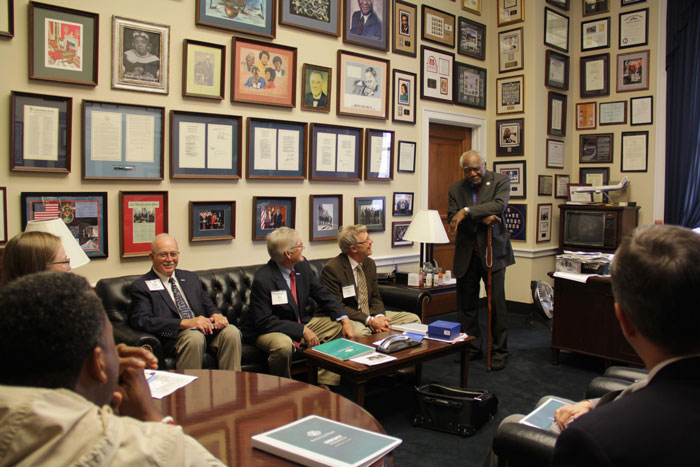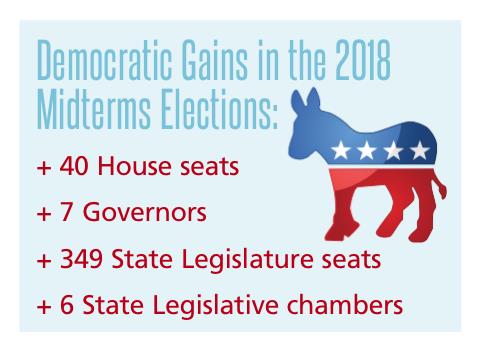1/1/2019
JZ on D.C.
Jennifer Zurko

Remember when you didn’t really have to “worry” about what was going on in Washington and you were able to vote for the representatives running in the party you supported without any doubts? Yeah, those days are over. It’s vital that voters educate themselves on the issues that affect their businesses and families so that they can have their voices heard by the people they choose to represent them. With that in mind, we’re replacing “SAF: In the Lobby” that’s been a regular department for over 20 years with an expanded section that will include news, views, commentary and event coverage about the goings-on in our government. Our goal is to keep you informed about the policies and legislation that directly affect our industry. If you have anything you’d like to share, email me at
jzurko@ballpublishing.com.
Industry ADVOCATES: Society of American Florists
SAF to Congress: Make Tax Code Small-Business Friendly
SAF, along with several other groups that are members of the Small Business Legislative Council (SBLC), submitted a statement for the record to the U.S. Senate Small Business & Entrepreneurship Committee urging Congress to improve tax reform for pass-through entities and avoid proposals that would cause significant harm to the small business retirement plan system.
The letter requested that the Section 199A deduction for pass-through entities be made permanent and that more businesses be permitted to take advantage of the 199A deduction. Currently, Section 199A excludes a large number of pass-through entities from the deduction and adds complexity to the tax code, forcing small businesses to struggle with new and extremely complicated rules. The letter also emphasized the importance of making the increased estate and gift tax permanent while maintaining the step-up in basis at death for the successful small businesses.
Noting that several portions of S. 2526, the Retirement Enhancement and Savings Act of 2018, are beneficial, the letter noted strong opposition to an element of the bill that “could provide a significant deterrent to individuals continuing to save in a small business retirement plan and result in the freezing or termination of many small business plans (by small business owners who have saved ‘enough’ in the plan).”
2526 has not yet been considered by the Senate and its future is uncertain given the recent midterm elections.
—Shawn McBurney, Senior Director —Government Relations, SAF
 Meet Your Policymakers in Person!
Meet Your Policymakers in Person!One of the ways you can influence your federal representatives is to meet with them and their staff during two advocacy events: SAF’s Congressional Actions Days and AmericanHort’s Impact Washington Summit.
The 39th annual Congressional Action Days will be held March 11-12 and registration is open now. For more information on the event and hotel, and to register, visit safnow.org.
Save the date for the Impact Washington Summit, which will be September 16-18. More information is coming, so check this section every month and visit americanhort.org.
Pictured: The delegation from Illinois speaks with Congressman Danny K. Davis (D-IL7) during last year’s Congressional Action Days.
Major Turnover in the House: How Will That Affect Us?
Historic turnover after the midterm elections may have shifted the balance of power in the U.S. House of Representatives, but according to SAF, the vast majority of relationships established between lawmakers and the floral industry will remain in place in the new Congress.
 Shawn McBurney, Senior Director—Government Relations for SAF, has spent the weeks since the midterms reviewing the returns to analyze where the industry now stands in Washington and to determine which legislators supported by SAFPAC, SAF’s political action committee, will be returning to Washington.
Shawn McBurney, Senior Director—Government Relations for SAF, has spent the weeks since the midterms reviewing the returns to analyze where the industry now stands in Washington and to determine which legislators supported by SAFPAC, SAF’s political action committee, will be returning to Washington.
Member turnover was heavy in this election, with House turnover estimated to be slightly more than 23%—a figure that’s high enough to rank the midterms as generating the third most turnover since 1974, trailing only elections in 1992 (26.1%) and 2010 (23.5%). The elections themselves capped an eventful year of lawmaker changes.
Although the major frustrations over labor and immigration remain, there have been some more floriculture-specific issues where SAF has succeeded in convincing lawmakers to support the industry, including significant increases in funding for the Floriculture & Nursery Research Initiative, relaunching the Floriculture Crops Report Survey. The expected passage of a new Farm Bill could also include helpful amendments to the Plant Variety Protection Act
In the House of Representatives, four members who received SAFPAC support announced months ago that they would be stepping down, notably Speaker of the House Paul Ryan (R-Wisconsin), Chairman of the Appropriations Committee Rodney Frelinghuysen (R-New Jersey) and Rep. Tom Rooney (R-Florida), a longtime floriculture supporter and member of the House Subcommittee for Agriculture.
Overall, 15 of the 17 (87.5%) House members that SAFPAC supported who ran for reelection won their races. SAFPAC saw the same winning percentage in the Senate with only one loss, Senator Joe Donnelly (D-Indiana).
—Source: SAF’s Floral Management publication
New Farm Bill Passes with Bipartisan Vote
 On Wednesday, December 12, 2018, Congress passed the new version of the Farm Bill in a swift bipartisan vote.
On Wednesday, December 12, 2018, Congress passed the new version of the Farm Bill in a swift bipartisan vote.
The Senate voted 87-13 on Tuesday the 11th, while the House passed the legislation by a 369-47 vote Wednesday afternoon. As of press time, the bill was awaiting the President’s signature to be enacted into law. When signed, the provisions in the new Farm Bill will be in effect until 2023.
The main question is: What’s in it for hort? There are four components that directly affect our industry:
• The Specialty Crop Research Initiative (SCRI) allows for specialty crops to compete for the full $80 million per year for specialty crop research. The new provisions provide a $125 million increase over current law for the new five-year Farm Bill.
• Specialty Crop Block Grants provides continued funding at $85 million a year. This was a significant increase in total funding for the program over the five-year lifespan of the Farm Bill, from $375 million to $425 million.
• Pest and disease research and prevention, which maintains FY2018 funding at $75 million per year. Overall, this is an increase of $50 million over the life of the 2018 Farm Bill. It also reauthorizes the National Clean Plant Network, which protects key sectors from pathogen threats by providing access to pathogen-tested accessions of the newest varieties of tree fruit, berry, roses, and other high-value horticultural crops.
• Greenhouse Crop Insurance, which initiates research and development into potential expansion/improvement of greenhouse crop insurance coverage.
Other key provisions include one that affects the breeding side of the industry, which is expanded plant intellectual property rights options, as well as language throughout the research title to ensure prioritization of research into labor-saving mechanization and automation in various USDA programs.
If you’re interested in what else is included in the new Farm Bill, including the legalization of hemp (no, really!), go to https://agriculture.house.gov/farmbill.
Industry ADVOCATES: AmericanHort
Leading the Way on Immigration
On November 15, the National Immigration Forum convened “Leading the Way: An American Approach to Immigration.” AmericanHort was a co-sponsor and participant in the Washington, D.C., event, which featured expert panels on immigration from the perspectives of business and the economy, faith and law enforcement.
Many speakers emphasized that immigration has been, is and will remain indispensable to America’s vitality. Many lamented the degraded national discourse over the role of immigrants and immigration in American society. But despite such laments, a hopeful and bipartisan tone was set by the opening speakers, Senators James Lankford (R-OK) and Michael Bennet (D-CO).
 Though Congress failed this year to address the issue, Senator Lankford noted that when the Senate considered four different bills earlier in the year, we in essence saw 80 U.S. senators support some version of a path to citizenship for at least some and border security measures. This suggests that there was enough common ground to move some kind of compromise forward. But then the courts stepped in, averting an immediate DACA crisis. With the pressure to act taken away, the moment of opportunity slipped away as well.
Though Congress failed this year to address the issue, Senator Lankford noted that when the Senate considered four different bills earlier in the year, we in essence saw 80 U.S. senators support some version of a path to citizenship for at least some and border security measures. This suggests that there was enough common ground to move some kind of compromise forward. But then the courts stepped in, averting an immediate DACA crisis. With the pressure to act taken away, the moment of opportunity slipped away as well.
Pictured: Senators James Lankford (center) and Michael Bennet (right) address Leading the Way.
Photo: Craig Regelbrugge
Senator Bennet, when asked what we all can do, advised attendees to double down on efforts to build the broadest possible coalition to press for action.
“The fact that you have pastors and farmers and law enforcement and business owners all in the room together building support for reform is powerful,” he said.
Given the results of the recent national election, both Lankford and Bennet expressed hope that divided government has, and can, provide an opening for those willing to try to reach across the political aisle to actually solve problems. Hope springs eternal!
—Craig Regelbrugge, VP of Government Relations & Research, AmericanHort